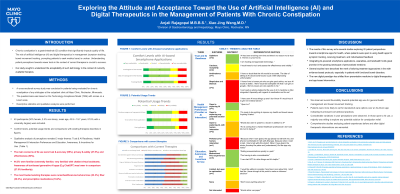Monday Poster Session
Category: Functional Bowel Disease
P2358 - Exploring the Attitude and Acceptance Toward the Use of Artificial Intelligence (AI) and Digital Therapeutics in the Management of Patients With Chronic Constipation
Monday, October 28, 2024
10:30 AM - 4:00 PM ET
Location: Exhibit Hall E

Has Audio

Anjali Rajagopal, MBBS
Mayo Clinic
Rochester, MN
Presenting Author(s)
Anjali Rajagopal, MBBS, Xiao Jing (Iris) Wang, MD
Mayo Clinic, Rochester, MN
Introduction: Chronic constipation is a gastrointestinal (GI) condition that significantly impacts quality of life. The role of artificial intelligence (AI) and digital therapeutics in management (symptom tracking, bowel movement tracking, prompting patients to seek medical care) is unclear. Understanding patient perception towards newer tools in the context of current therapies is crucial to success.
Methods: A cross-sectional survey study was conducted in patients being evaluated for chronic constipation of any etiologies at an outpatient GI clinic. The questionnaire was based on the Technology Acceptance Model (TAM) with scores on a Likert scale. Descriptive statistics and qualitative analysis were performed.
Results: 40 participants (50% female, 2.5% non-binary; mean age, 43.9 + 19.7 years; 57.5% with a university degree) were included. 80% were either comfortable or very comfortable with using a smartphone application to track their health, with 62.5% expressing comfort in using an app to track bowel movements. Only 27.5% were comfortable obtaining medical advice from an AI-based app (Fig.1 A&B). The main concerns of AI use were trust & accuracy (55%), privacy & safety (47.5%), and effectiveness (50%). 44.5% were familiar (extremely, very) with chatbot virtual assistants. Awareness of text-based generative AI apps (E.g. ChatGPT) was lower (27.5% familiarity). The most trusted existing therapies were nurse/healthcare-led advice lines (33.3%), fiber (30.3%), and prescription medications (18.2%). Qualitative analysis of perceptions revealed 3 major themes: Trust & AI Readiness (optimism, cautious receptivity, ambivalence, skepticism), Health Management & Interaction Preferences (open to exploring: AI, AI with human interaction, any solution; preference for human), and Knowledge, Awareness, & Incentives for Use (specific motivations, limited, none, not interested) (Fig.2).
Discussion: We observed overall favorability towards potential app use for general health management and bowel movement tracking. However, patients were more likely to opt for standard-of-care options over an AI-driven app indicating trust toward conventional practices. Considerable variations in user perceptions were observed. In those open to AI use, a majority was willing to explore any potential solution for constipation relief highlighting its debilitating nature. Comprehensive studies analyzing patient experiences before and after digital therapeutic interventions are warranted.

Note: The table for this abstract can be viewed in the ePoster Gallery section of the ACG 2024 ePoster Site or in The American Journal of Gastroenterology's abstract supplement issue, both of which will be available starting October 27, 2024.
Disclosures:
Anjali Rajagopal, MBBS, Xiao Jing (Iris) Wang, MD. P2358 - Exploring the Attitude and Acceptance Toward the Use of Artificial Intelligence (AI) and Digital Therapeutics in the Management of Patients With Chronic Constipation, ACG 2024 Annual Scientific Meeting Abstracts. Philadelphia, PA: American College of Gastroenterology.
Mayo Clinic, Rochester, MN
Introduction: Chronic constipation is a gastrointestinal (GI) condition that significantly impacts quality of life. The role of artificial intelligence (AI) and digital therapeutics in management (symptom tracking, bowel movement tracking, prompting patients to seek medical care) is unclear. Understanding patient perception towards newer tools in the context of current therapies is crucial to success.
Methods: A cross-sectional survey study was conducted in patients being evaluated for chronic constipation of any etiologies at an outpatient GI clinic. The questionnaire was based on the Technology Acceptance Model (TAM) with scores on a Likert scale. Descriptive statistics and qualitative analysis were performed.
Results: 40 participants (50% female, 2.5% non-binary; mean age, 43.9 + 19.7 years; 57.5% with a university degree) were included. 80% were either comfortable or very comfortable with using a smartphone application to track their health, with 62.5% expressing comfort in using an app to track bowel movements. Only 27.5% were comfortable obtaining medical advice from an AI-based app (Fig.1 A&B). The main concerns of AI use were trust & accuracy (55%), privacy & safety (47.5%), and effectiveness (50%). 44.5% were familiar (extremely, very) with chatbot virtual assistants. Awareness of text-based generative AI apps (E.g. ChatGPT) was lower (27.5% familiarity). The most trusted existing therapies were nurse/healthcare-led advice lines (33.3%), fiber (30.3%), and prescription medications (18.2%). Qualitative analysis of perceptions revealed 3 major themes: Trust & AI Readiness (optimism, cautious receptivity, ambivalence, skepticism), Health Management & Interaction Preferences (open to exploring: AI, AI with human interaction, any solution; preference for human), and Knowledge, Awareness, & Incentives for Use (specific motivations, limited, none, not interested) (Fig.2).
Discussion: We observed overall favorability towards potential app use for general health management and bowel movement tracking. However, patients were more likely to opt for standard-of-care options over an AI-driven app indicating trust toward conventional practices. Considerable variations in user perceptions were observed. In those open to AI use, a majority was willing to explore any potential solution for constipation relief highlighting its debilitating nature. Comprehensive studies analyzing patient experiences before and after digital therapeutic interventions are warranted.

Figure: Fig. 1 A&B, Comfort levels and potential usage trends with AI-based smartphone applications in patients with chronic constipation
Fig. 2. Usage-preference comparisons (AI-based smartphone applications vs current therapies)
Fig. 2. Usage-preference comparisons (AI-based smartphone applications vs current therapies)
Note: The table for this abstract can be viewed in the ePoster Gallery section of the ACG 2024 ePoster Site or in The American Journal of Gastroenterology's abstract supplement issue, both of which will be available starting October 27, 2024.
Disclosures:
Anjali Rajagopal indicated no relevant financial relationships.
Xiao Jing (Iris) Wang indicated no relevant financial relationships.
Anjali Rajagopal, MBBS, Xiao Jing (Iris) Wang, MD. P2358 - Exploring the Attitude and Acceptance Toward the Use of Artificial Intelligence (AI) and Digital Therapeutics in the Management of Patients With Chronic Constipation, ACG 2024 Annual Scientific Meeting Abstracts. Philadelphia, PA: American College of Gastroenterology.
